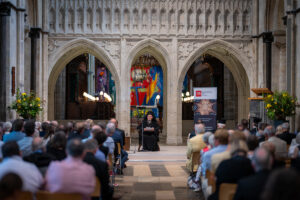“Prime Minister Abiy Ahmed should not stay silent because the longer he’s silent and does not take action, Ethiopians and the perpetrators will view it as this is not a priority for Abiy Ahmed’s administration.”
We see this all over the world: the authorities who should be protecting Christians instead do nothing to aid them, or even actively support their persecutors.
The Ethiopian Tewahedo Orthodox Church is an ancient Church that separated from Holy Orthodoxy over the Ecumenical Council of Chalcedon in 451. It is not at present in communion with the Ecumenical Patriarchate or other Orthodox Churches, but with the Coptic Orthodox Church of Alexandria. Around 45 to 50 million people are members of the Tewahedo Orthodox Church, mostly in Ethiopia itself, where despite the fact that Christians make over 60% of the population, they are still subject to incidents of violence such as those described here.
“‘They will murder you’: Churches burned and worshippers killed in Ethiopia’s ethnic carnage,” by Jeffrey Cimmino, Washington Examiner, September 21, 2019:
Over a year after the ascent of a new prime minister in Ethiopia bred hope for reform, bursting ethnic tensions are sending the country into a spiral of violence that is leaving churches and worshippers subject to property damage and murder.
Thirty churches, mostly Ethiopian Orthodox, have been attacked, 18 have been burned to the ground, and almost 100 worshippers have been killed since July 2018, Tewodros Tirfe, chairman of the Amhara Association of America, an organization that advocates on behalf of Ethiopia’s Amhara people, told the Washington Examiner. Christians and non-Christians alike have been caught up in the crossfire of heightened ethnic and political violence. Earlier this month, Ethiopian Orthodox Church leaders and government officials met, while Christians protested the violence directed at them.
The protests and meetings have yet to produce a concrete plan of action from the government, although they are a major problem for Prime Minister Abiy Ahmed, who has struggled to control violence among the country’s roughly 80 ethnic groups, despite inspiring optimism across the world when he assumed office last April.
Vice President Mike Pence praised Abiy last July, lauding his “historic reform efforts” and noting his work on “improving respect for human rights, reforming the business environment, and making peace with Eritrea.” Abiy oversaw the release of hundreds of political prisoners, and a CNN report from December labeled him the prime minister “who captured Africa’s imagination.”
Yet while Abiy ushered in a period of greater freedom, his reforms also opened the door to Ethiopians demanding new rights and addressing grievances through violence.
“What happened when Abiy came to power is just this cathartic relief of frustrations from all kinds of different types of communities — religious, ethnic, political — people were finally able to speak,” said Felix Horne, a senior researcher at Human Rights Watch.
Horne added that the state does not appear to be taking seriously issues of law and order. In some cases, the central government will leave ethnic disputes over land to local authorities, despite the fact these lower-level authorities tend to be tied to a certain side in the disputes.
Ethiopia’s political structure and geography reinforces these ethnic divisions, as state boundaries roughly coincide with ethnic boundaries. Ethiopia is also surrounded by countries such as Somalia, Eritrea, and Sudan, which are dealing with terrorism and other forms of political violence. As Ethiopia has witnessed a breakdown of internal security, Horne noted the country’s border has also grown more porous, allowing small arms to enter the country and make ethnic conflict deadlier. About 3 million people are internally displaced from conflict, more than anywhere else in the world.
“People are relying on their ethnicities, and they will kill you or they will murder you for the reason that you do not belong to their tribes,” Rev. Nehemiah Getu, a Maryland-based Ethiopian Orthodox priest, told the Washington Examiner.
Ethiopian churches have not been spared the consequences of this violence, and ethnic resentments likely play a role. Through the late 20th century, the Ethiopian Orthodox Church was closely connected to the state and the Amharas, who were the dominant ethnic group, and many members of other ethnic groups perceive the church as a tool of repression….
Last August, worshippers and priests in the Somali region of eastern Ethiopia were killed after the regional governor, who was on the brink of being removed from power by the central government, ordered mobs of supporters to attack non-Somalis. Many of the non-Somalis in the region are Christian, said Horne, so the mobs attacked churches and other institutions important to Christians….
“Prime Minister Abiy Ahmed should not stay silent because the longer he’s silent and does not take action, Ethiopians and the perpetrators will view it as this is not a priority for Abiy Ahmed’s administration,” said Tirfe. “The Ethiopian Orthodox Tewahedo Church has already stated they will take matters into their own hands to safeguard their faith if the government cannot.”







